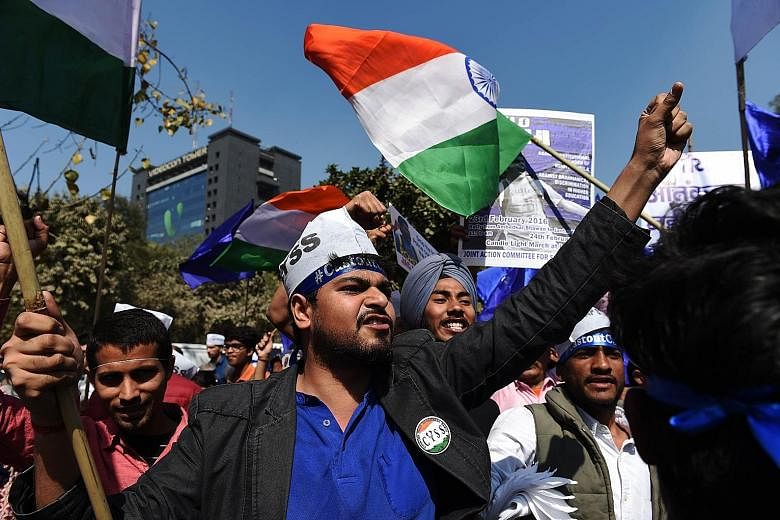Indian Prime Minister Narendra Modi, under pressure over his government's handling of caste violence in northern Haryana state and a student's arrest on sedition charges, said yesterday as Parliament reconvened that the world is watching India's economy and he hoped criticism would be "constructive".
Analysts say Mr Modi's authority is under challenge after week-long protests by members of the Jat community demanding quotas in government colleges and jobsleft 18 people dead, more than 150 people injured and a property repair bill in the millions. The caste issue had been simmering for some time, with the ruling Bharatiya Janata Party (BJP) facing criticism for not effectively engaging with the Jats, an affluent caste whose young are struggling to get jobs.
Although protests have slowly eased after the government's promise to bring in legislation offering quotas, curfews remain in several towns in Haryana.
Yesterday, the state's chief minister, Mr Manohar Lal Khattar, a key Modi ally, was heckled by locals in the town of Rohtak.
The arrest of Jawaharlal Nehru University student union leader Kanhaiya Kumar on charges of sedition on Feb 12 has also hurt the government, said analysts.
Home Minister Rajnath Singh promised tough action against the student, with ultra-nationalist lawyers beating up the student and even targeting journalists in court.
BJP legislator O.P. Sharma was caught on camera thrashing a left-wing activist in court over the issue.
Another BJP legislator, Mr Gyandev Ahuja, yesterday was criticised for saying 2,000 liquor bottles were found in the university every day - even as Indian media reported that footage of the Feb 9 rally where the student was accused of making anti-national statements may have been doctored. Mr Kumar's bail hearing is expected to come up in the Delhi High Court today.
Analysts said that the government had not been able to manage the crisis effectively either in Haryana or Delhi.
"They could have used a little more political finesse to prevent themselves from getting a negative image. These two episodes have pointed out the government's inability to effectively manage a crisis," said Dr Sandeep Shastri, pro vice-chancellor of Jain University in Bangalore.
Delhi-based political analyst Amulya Ganguli said: "The student unrest should be easiest to control, yet the government has failed to do so.''
The Modi government came to power on a massive majority on the back of support from a cross-section of people, particularly young Indians won over by promises of development and creation of jobs.
Nearly two years into government, Mr Modi, while still remaining the most popular political leader, is seen by many sections to have failed to live up to expectations.
Instead, he has been accused by critics of watching quietly as far-right groups and ultra-nationalists whip up sentiments in a bid to increase their influence, including in educational institutes.
Last month, student leader Rohith Vemula committed suicide at Hyderabad University after his scholarship money was cut off over a tiff with the Akhil Bharatiya Vidyarthi Parishad, the student wing of the Rashtriya Swayamsevak Sangh, the ideological backbone of the Hindu-nationalist BJP.
Yesterday, thousands of students and opposition leaders took part in a solidarity march in Central Delhi for Mr Vemula and Mr Kumar.
"Student agitation is part and parcel of Indian politics. The democratic framework is working and the government is doing what it can and everything is before the court of law,'' said Professor Bidyut Chakrabarty, a political science professor at Delhi University.

